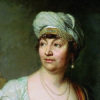Madame de Stael

Madame de Stael
Anne Louise Germaine de Staël-Holstein, commonly known as Madame de Staël, was a French woman of letters of Swiss origin whose lifetime overlapped with the events of the French Revolution and the Napoleonic era. She was one of Napoleon's principal opponents. Celebrated for her conversational eloquence, she participated actively in the political and intellectual life of her times. Her works, both critical and fictional, made their mark on the history of European Romanticism...
NationalityFrench
ProfessionWriter
Date of Birth22 April 1766
CountryFrance
It seems to me that life's circumstances, being ephemeral, teach us less about durable truths than the fictions based on those truths; and that the best lessons of delicacy and self-respect are to be found in novels where the feelings are so naturally portrayed that you fancy you are witnessing real life as you read.
Prayer is more than meditation. In meditation the source of strength is one's self. When one prays he goes to a source of strength greater than his own.
Self-love, so sensitive in its own cause, has rarely any sympathy to spare for others.
Atheism exists only in coldness, selfishness, and baseness.
Men err from selfishness; women because they are weak.
Love is the emplem of eternity; it confounds all notions of time; effaces all memory of begining, all fear of an end.
We understand death for the first time when he puts his hand upon one whom we love
Prayer is more than meditation. In meditation, the source of strength is one's self. When one prays, he goes to a source of strength greater than his own.
Wit consists in knowing the resemblance of things that differ, and the difference of things that are alike.
When a noble life has prepared for old age, it is not decline that it reveals, but the first days of immortality.
[Moralistic] novels are at the same disadvantage as teachers: children never believe them, because they make everything that happens relate to the lesson at hand.
How true it is that, sooner or later, the' most rebellious must bow beneath the yoke of misfortune!
Love is the history of a woman's life; it is an episode in man's. [Fr., L'amour est l'histoire de la vie des femmes; c'est un episode dans celle des hommes.]
Men have made of fortune an all-powerful goddess, in order that she may be made responsible for all their blunder's.